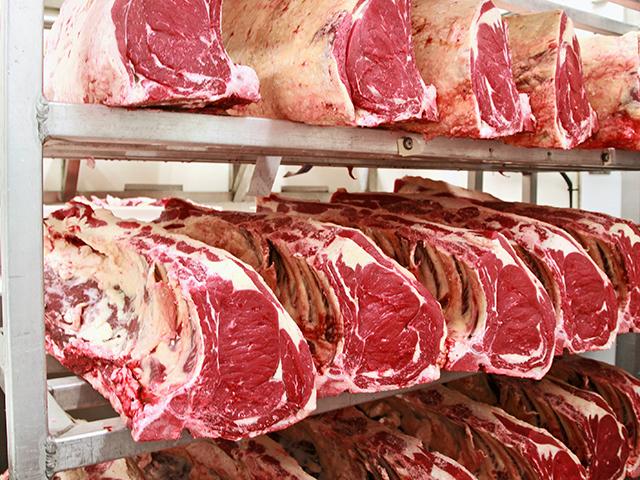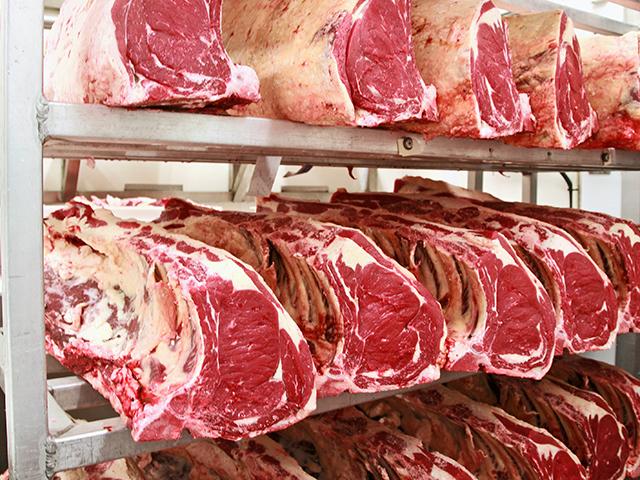Ag Policy Blog
Rollins Criticizes Beef Processing Concentration
In discussing beef prices Monday, Agriculture Secretary Brooke Rollins was critical of the concentration of beef processing in four firms.
In an appearance in Dallas on "The Will Cain Show" on Fox News, Rollins pointed out that four meatpacking firms process 85% of the beef in the United States and that two of the four biggest meatpacking firms are Brazilian owned.
Rollins said it's necessary to "decentralize, deregulate" the beef processing industry, and that the importation of Argentine beef would lower the price of ground meat, which is important to lower income consumers."
Rollins also blamed the government shutdown on the Democrats and said the government should be reopened so that Supplemental Nutrition Assistance Program (SNAP) participants can get their benefits.
SNAP CUTS COME INTO FOCUS
The United Food and Commercial Workers International Union sent Rollins a letter Monday urging her to fund SNAP benefits for November.
House Democrats also wrote Rollins, sending a letter signed by 214 members, urging Rollins to use contingency reserve funds for SNAP. "There is enough in the SNAP contingency reserve to cover nearly two-thirds of the amount needed for a full month of benefits. As such, the Members also advocate for the agency to use statutory transfer authority or any other legal means to supplement shortfalls the contingency reserve cannot cover," House Democrats wrote.
The letter added, "We urge USDA to use these funds for November SNAP benefits and issue clear guidance to states on how to navigate benefit issuance."
Sen. Josh Hawley, R-Mo., suggested he and other Senate Republicans may try to seek unanimous consent on a bill to fund SNAP for the duration of the shutdown, Politico reported. In a news release, Hawley said, "More than 650,000 Missourians stand to lose their access to food benefits next month because Democrats refuse to fund the government."
"The vast majority of those Missourians are families with children. The Keep SNAP Funded Act would ensure full funding for the SNAP program during the government shutdown. Under the bill, Congress would appropriate the necessary funding to provide uninterrupted SNAP benefits, retroactive to the start of the shutdown."
Sens. James Lankford, R-Okla.; Marsha Blackburn, R-Tenn.; Susan Collins, R-Maine; Bernie Moreno, R-Ohio; Kevin Cramer, R-N.D., and Lisa Murkowski, R-Alaska, have signed on as cosponsors of Hawley's bill.
P[L1] D[0x0] M[300x250] OOP[F] ADUNIT[] T[]
Meanwhile, the American Federation of Government Employees (AFGE) called for passage of a clean continuing resolution.
AFGE President Everett Kelley wrote, "It's time for our leaders to start focusing on how to solve problems for the American people, rather than on who is going to get the blame for a shutdown that Americans dislike."
"Because when the folks who serve this country are standing in line for food banks after missing a second paycheck because of this shutdown, they aren't looking for partisan spin. They're looking for the wages they earned. The fact that they're being cheated out of it is a national disgrace."
ECONOMISTS RESPOND TO SUPREME COURT ABOUT TARIFFS
A coalition of 465 economists submitted a letter to the Supreme Court in the case of Trump v. V.O.S. Selections over President Trump's authority to impose emergency tariffs.
The economists noted that the Trump administration has argued that terminating its sweeping "national emergency" tariffs would have "catastrophic consequences for our economy."
The economists wrote, "This is backwards. The greater threat to the economy of the United States is not that the Trump administration's tariffs will be struck down, but that they will be allowed to remain in place."
The letter was released by the National Taxpayers Union.
The Libertarian-leaning Cato Institute also filed a brief in the case stating that "the Constitution vests tariff-setting power solely in Congress." The brief cites that Congress has always retained the power to set tariffs, "even during wars and financial crises, and has never delegated open-ended tariff authority to the executive branch."
A group of congressional Democrats also filed an amicus brief before the Supreme Court, charging that Trump had unlawfully imposed the tariffs under the International Emergency Economic Powers Act (IEEPA).
"Trump does not have the power to unilaterally impose these tariffs under IEEPA, yet he continues to act on his own whims and falsely justify his abuse of power," Rep. Richard Neal, D-Mass., the ranking member on the House Ways and Means Committee said in a news release.
"We expect the Supreme Court to again see the merits of our argument and the dangers of the President's actions, turn the tariffs off, and restore Congress's rightful responsibility."
CHICKEN, PORK PRODUERS WEIGH IN ON ULTRA-PROCESSED FOODS
The National Chicken Council has submitted comments to the Agriculture Department and the Food and Drug Administration on the Trump administration's proposal to define ultra-processed foods.
"We urge FDA and USDA to adopt a nutrition-led framework that promotes consumption of safe, affordable, and culturally important proteins like chicken, which millions of families, schools, and food assistance programs rely on for essential nutrition," said NCC Senior Vice President of Scientific Affairs Ashley Peterson in the comments.
"Should the agencies choose to pursue a classification system, NCC is committed to working with FDA, USDA, and other stakeholders on a clear, science-driven system that protects public health without unintendedly discouraging consumption of nutrient-dense foods."
son also said, "the so-called term 'ultra-processed foods' is overly broad and can mislead consumers by implying a food is harmful based solely on how it is made rather than its nutrient content."
The National Pork Producers Council said, "As FDA formulates a definition of "ultra-processed foods," the agency should:
"Not classify food as ultra-processed simply because it does not fit into one of three categories (out of four) of the problematic NOVA classification system. Such a sorting focuses on the processing of foods rather than the nutritional benefits.
"Not categorize food as ultra-processed that contains ingredients that enhance food safety, shelf stability, and nutrient availability. Such ingredients protect public health and allow nutrient dense foods to reach consumers.
"Ensure an ultra-processed foods definition does not conflict with FDA's Standards of Identity regulations, which detail what specific foods must contain, the amount or proportion of ingredients or components, and, sometimes, the method of production or formulation," the NPPC said.
DTN Ag Policy Editor Chris Clayton contributed to this report.
Jerry Hagstrom can be reached at jhagstrom@nationaljournal.com
Follow him on social platform X @hagstromreport
(c) Copyright 2025 DTN, LLC. All rights reserved.






Comments
To comment, please Log In or Join our Community .